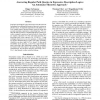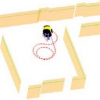1047 search results - page 141 / 210 » Learning the required number of agents for complex tasks |
ICRA
2002
IEEE
14 years 23 days ago
2002
IEEE
—Creation of cooperative robot teams for complex tasks requires not only agents that can function well individually but also agents that can coordinate their actions. This paper ...
AAAI
2007
13 years 10 months ago
2007
Expressive Description Logics (DLs) have been advocated as formalisms for modeling the domain of interest in various application areas. An important requirement is the ability to ...
ATAL
2010
Springer
13 years 9 months ago
2010
Springer
The primary target of this work is human-robot collaboration, especially for service robots in complicated application scenarios. Three assumptions and four requirements are ident...
ICPR
2006
IEEE
14 years 9 months ago
2006
IEEE
In this paper, we propose a new, hierarchical approach to landmark selection for simultaneous robot localization and mapping based on visual sensors: a biologically motivated atte...
EH
2000
IEEE
14 years 7 days ago
2000
IEEE
Evolvable Hardware (EHW) has the potential to become a new target hardware for complex real-world applications. However, there are several problems that would have to be solved to...


